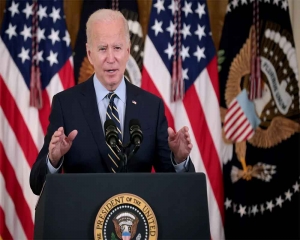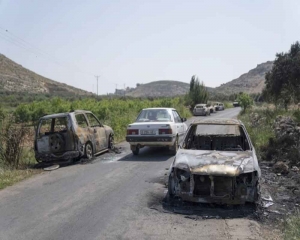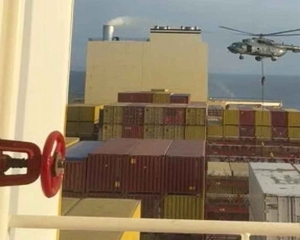If we want to create conditions for peace, we must treat climate change action and mitigation as the moral equivalent of war. If not, our depredation on nature will invite a devastating response
There are dangerous weather events taking place worldwide. The most tragic occurrence which has just taken place this week is the infernal wildfire in Greece, leading to over 80 estimated deaths in that island nation where many people had to plunge into the sea to escape the raging flames. Northern California is yet another region which has suffered from wildfires over the last several years, leading to major economic damage and destruction as well as dozens of deaths. Even now there is a serious fire engulfing parts of the iconic Yosemite Park with the prospect of spreading rapidly. In 2017, there was a huge fire in Portugal which destroyed vast areas of forests and led to 60 deaths. On that occasion Portugal’s Prime Minister António Costa described these fires as “the greatest tragedy we have seen in recent years in terms of forest fires”.
While much of Japan, parts of Europe, including the UK, and various locations in North America are suffering from record high temperatures, the countries of South-east Asia, including laos and Vietnam, are suffering from monsoon floods with tragic loss of life and property. Japan is undergoing a terrible emergency with record high temperatures in a prolonged heat wave which has been responsible for several deaths across the country. In the People’s Republic of China, certain parts are suffering from heavy floods as a result of extremely heavy rainfall. Some time back, it was reported that a hundred people were feared to have been buried in a landslide in a location in Southwestern China. The floods currently creating havoc across China are reported to have killed 50 persons and more than a million have been displaced.
Those parts of the world, which have escaped the fury of these frequent and intense extreme events, do not have reasons to feel secure because as the Intergovernmental Panel on Climate Change (IPCC) clearly found, there is no location on earth which is immune to the impacts of climate change, which are now, as clearly projected by the IPCC, being subjected to widespread and severe extreme events. last year’s hurricane season caused massive destruction in the Caribbean region and North America, including vast areas in the city of Houston,Texas, which were under water for several days. Of course, it is the poorest and most deprived communities, in both the richest and poorest nations, who are the worst affected as a result of these events, since they lack the infrastructure and institutional capabilities to cope with disaster. And, the world has so far done very little to enhance their ability to adapt the impacts of climate change.
While the current US Administration is rolling back even the inadequate policies and regulatory measures which were introduced earlier to reduce the emissions of greenhouse gases (GHGs), the Pentagon, in a series of reports over the past few years, has highlighted the security risks resulting from the impacts of climate change. In a study published earlier this year, the Pentagon stated that wild weather could endanger half of the US bases worldwide and extreme weather could endanger 1,700 sites. This would include large bases to smaller outposts in different parts of the world. Based on a detailed survey carried out by the US Department of Defence, the report came to the conclusion that “changes in climate can potentially shape the environment in which we operate and the missions we are required to do.” It went to the extent of taking the view that “if extreme weather makes our critical facilities unusable or necessitates costly or manpower-intensive workarounds, that is an unacceptable impact”. The detailed study, which surveyed all the US military installations worldwide known to number more than 3,500, is a timely confirmation of several studies that have been carried out by or on behalf of the Pentagon for several years now.
There are now compelling reasons why the world must mitigate the emissions of GHGs on a war footing. If we do not, then wars, which we all hope will not take place in future, could be lost due to the impacts of climate change. What is even more significant is the fact that the impacts of climate change could have devastating results far worse than the damage that large wars can produce. A significant example is provided by the island of Puerto Rico, which was completely devastated last year by Hurricane Maria, and which knocked out the entire power supply system of that island and disrupted the supply of water, with thousands of persons losing their lives.
The Paris Agreement on climate change set a goal of reducing the emissions of GHGs to a level which would ensure that by the end of the century, temperature increase would not exceed 2oC. Currently, the trajectory of emissions is such that the 2oC limit would be exceeded by far, and in any case, even if this goal was achieved, sea level rise would continue for several centuries which endangers the existence of many small island states, the Caribbean region and mega deltas where cities like Shanghai, Dhaka and Kolkata would be in grave danger.
The world has to move rapidly to low carbon sources of energy and move away from the use of fossil fuels. Human society would also need to bring about major changes in lifestyles, which need to move towards a far less wasteful society than we have today. These changes would involve a curb on senseless consumerism and dietary changes apart from the use of sustainable forms of transport. In the case of food and diet, the world will have to reduce the consumption of beef which is associated not only with very high levels of carbon dioxide emissions but is also intensive in the use of water. Besides, health reasons suggest a move worldwide to lower meat consumption.
If we wish to create conditions for peace across nations, then we need to treat climate change action and mitigation as the moral equivalent of war. If not, then the collective war which we have waged on nature would invite a devastating response that would give us no peace on earth. The assault we need to mount is on ignorance and vested interests who prevent a move away from wasteful consumerism and an addiction to fossil fuels.
(The writer is former chairman, Intergovernmental Panel on Climate Change, 2002-15)

























